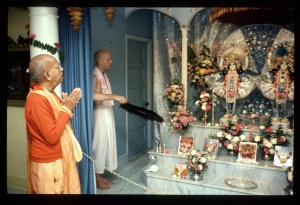SB 9.6.15-16

A.C. Bhaktivedanta Swami Prabhupada
TEXTS 15-16
- sa sannaddho dhanur divyam
- ādāya viśikhāñ chitān
- stūyamānas tam āruhya
- yuyutsuḥ kakudi sthitaḥ
- tejasāpyāyito viṣṇoḥ
- puruṣasya mahātmanaḥ
- pratīcyāṁ diśi daityānāṁ
- nyaruṇat tridaśaiḥ puram
SYNONYMS
saḥ — he, Purañjaya; sannaddhaḥ — being well equipped; dhanuḥ divyam — a first-class or transcendental bow; ādāya — taking; viśikhān — arrows; śitān — very sharp; stūyamānaḥ — being praised very much; tam — him (the bull); āruhya — getting on; yuyutsuḥ — prepared to fight; kakudi — on the hump of the bull; sthitaḥ — being situated; tejasā — by the power; āpyāyitaḥ — being favored; viṣṇoḥ — of Lord Viṣṇu; puruṣasya — the Supreme Person; mahā-ātmanaḥ — the Supersoul; pratīcyām — on the western; diśi — direction; daityānām — of the demons; nyaruṇat — captured; tridaśaiḥ — surrounded by the demigods; puram — the residence.
TRANSLATION
Well protected by armor and desiring to fight, Purañjaya took up a transcendental bow and very sharp arrows, and, while being highly praised by the demigods, he got up on the back of the bull [Indra] and sat on its hump. Thus he is known as Kakutstha. Being empowered by Lord Viṣṇu, who is the Supersoul and the Supreme Person, Purañjaya sat on the great bull and is therefore known as Indravāha. Surrounded by the demigods, he attacked the residence of the demons in the west.